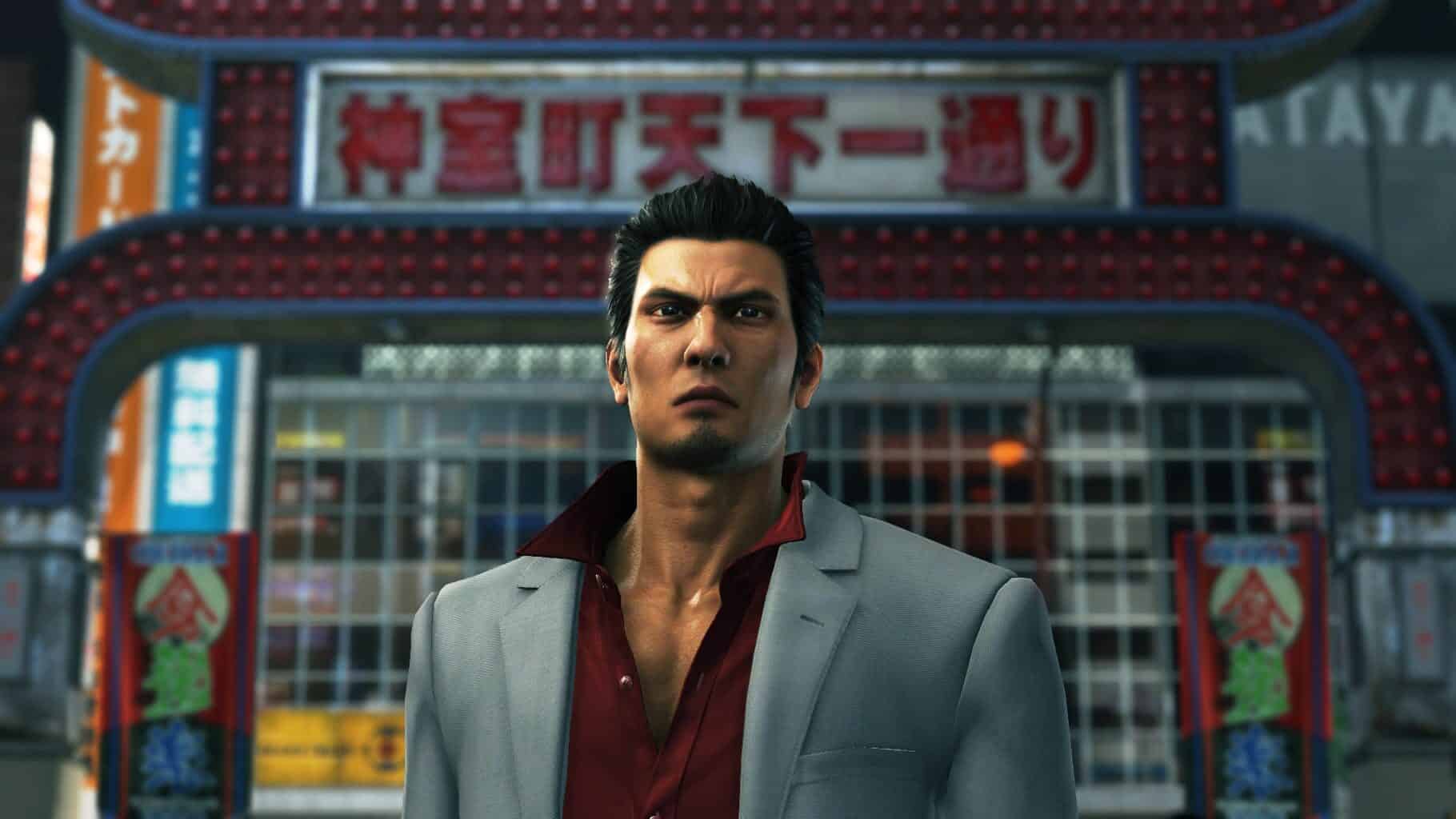The Yakuza video games have carved out a major niche in the gaming industry with their compelling narratives, vibrant settings, and immersive world building. Since the first game came out in 2005, the series has grown in popularity and spawned many sequels and spin-offs. If you’re thinking of diving into the franchise and exploring the Japanese criminal underworld, then join us on this journey through the Yakuza games that have been released in the West. We’ll look at each installment’s unique features, stories, and contributions to the franchise.
Yakuza (2005)
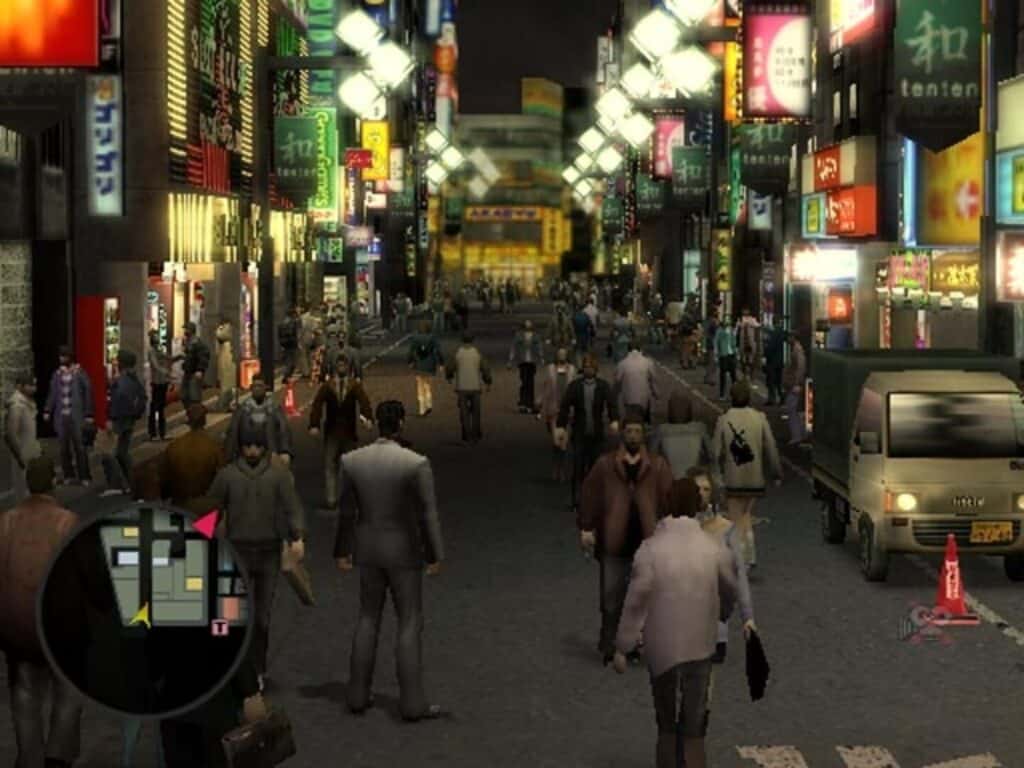
Platforms: PlayStation 2
The game that started it all, Yakuza, introduced players to the seedy underbelly of Tokyo’s fictional Kamurocho district (based on the real-life Kabukicho entertainment district) through the eyes of Kazuma Kiryu. The narrative is a web of betrayal and intrigue within the Tojo Clan, a powerful Yakuza organization. The gameplay blends brawler combat, open-world exploration, and a wide array of side activities, from karaoke to managing a hostess club.
Kiryu’s stoic demeanor and unwavering sense of honor make him a standout leading man. The game’s rich storytelling echoes classic gangster and crime noir films. Yakuza set the tone for the series with its mix of serious crime drama and offbeat humor, creating a distinct identity and an award-winning smash-hit for Sega.
Yakuza 2 (2006)
Platforms: PlayStation 2
Building on the original’s success, Yakuza 2 continues Kazuma Kiryu’s journey. This time, he gets caught up in a battle between rival Yakuza clans and uncovers deeper conspiracies within the criminal underworld. The game retains the brawler-style combat but adds new heat actions and improved graphics.
The sequel expands the game world and fleshes out the many side activities even more. Kiryu’s relationships with other characters are central to the story, and players witness his growth as a man. Yakuza 2 solidifies the series’ reputation for cinematic storytelling and introduces gameplay refinements that would become staples in future titles.
Yakuza 3 (2009)
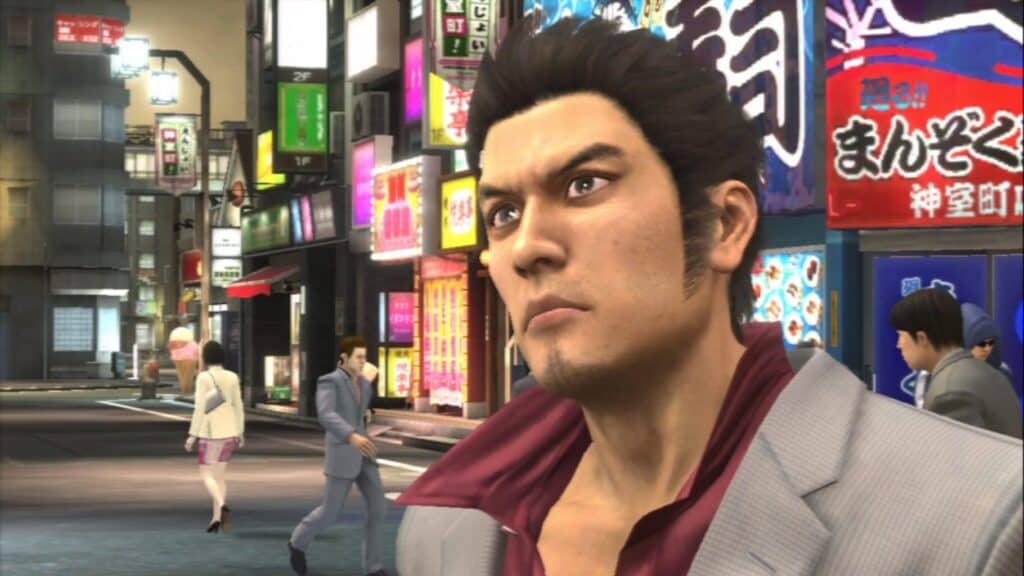
Platforms: PlayStation 3, PlayStation 4, Xbox One, Windows PC
Yakuza 3 marks the series’ transition to the PlayStation 3. Kazuma Kiryu is now living a peaceful life in Okinawa. However, he gets pulled back into Japan’s criminal underworld world when events from his past catch up to him. This installment introduces a new setting along with new side activities, such as managing an orphanage and minigames like golf.
A major element of Yakuza 3 is its emphasis on Kiryu’s fatherly role and his efforts to protect the orphans. The narrative flavor of the franchise remains intact despite the game’s shift in focus and locale, however, and stays true to the core themes of honor and redemption. The attention to detail in depicting Japanese culture and regions also exemplifies the developer’s knack for world-building.
Yakuza 4 (2010)
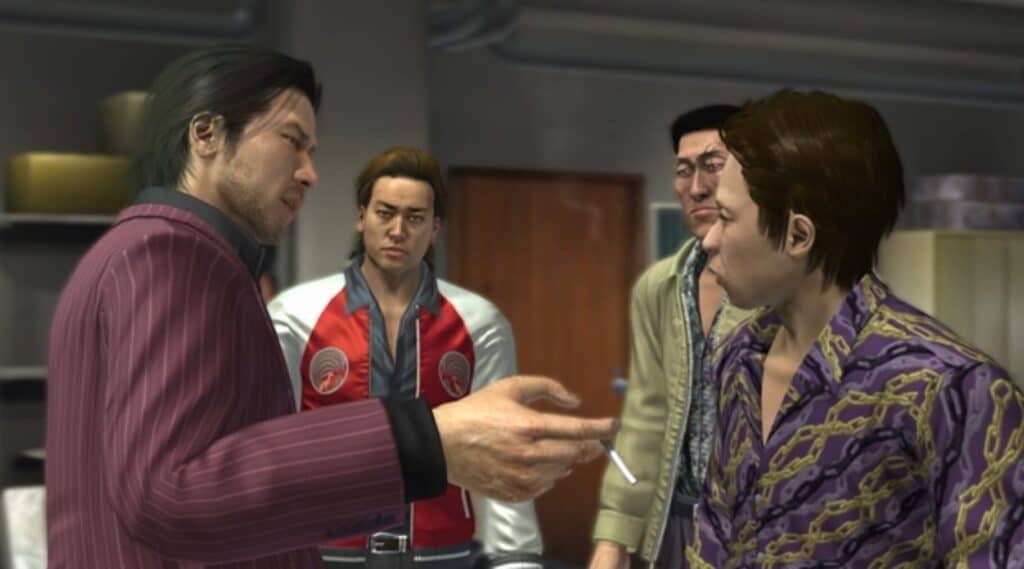
Platforms: PlayStation 3, PlayStation 4, Xbox One, Windows PC
Yakuza 4 makes a bold change by featuring multiple playable characters, each with their own intertwining storylines. Alongside Kiryu, players also control a loan shark, a convicted murderer, and a cop. The game revolves around a complex plot that reveals the connections between these very different men.
The inclusion of multiple protagonists breathes new life into the Yakuza games, allowing players to explore and experience events from different perspectives. Each character also has his own unique fighting style to add more variety to the combat.
Yakuza: Dead Souls (2012)
Platforms: PlayStation 3
Yakuza: Dead Souls is a spin-off released in 2012. It takes a drastic departure from the mainline Yakuza games by introducing a zombie apocalypse to the streets of Kamurocho. Players assume the roles of various Yakuza characters, including Kiryu, Goro Majima, Ryuji Goda, and Shun Akiyama. They must band together to combat hordes of undead threatening to overrun Tokyo.
Dead Souls combines third-person brawling, chaotic gunplay, and a healthy dose of dark humor. Despite a lukewarm reception from critics, it’s a unique and memorable experience within the Yakuza universe. Dead Souls offers fans an undeniably entertaining departure from the traditional formula of other Yakuza games.
Yakuza 5 (2012)
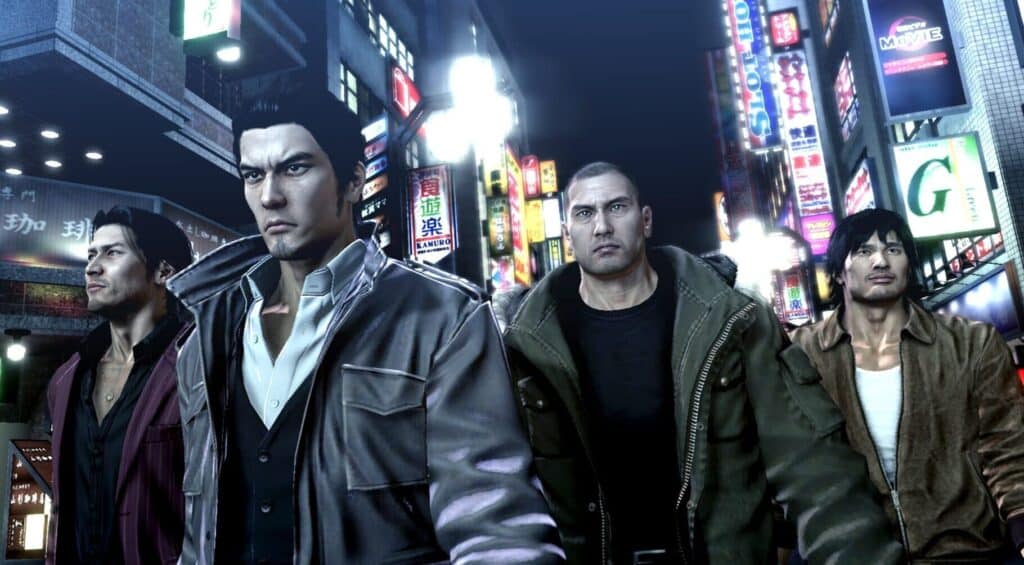
Platforms: PlayStation 3, PlayStation 4, Xbox One, Windows PC
Yakuza 5 expands upon the character-building of the fourth installment and further broadens the series’ scope. This entry features five playable characters across five cities, offering a buffet of content for fans to chew on.
Each character’s storyline brings plenty of drama and character development in keeping with the series’ narrative themes of honor and brotherhood. The game also introduces a few new activities like taxi driving and hunting, keeping the gameplay fresh with plenty of minigames and side quests that remain a hallmark of the franchise.
Yakuza 6: The Song of Life (2016)
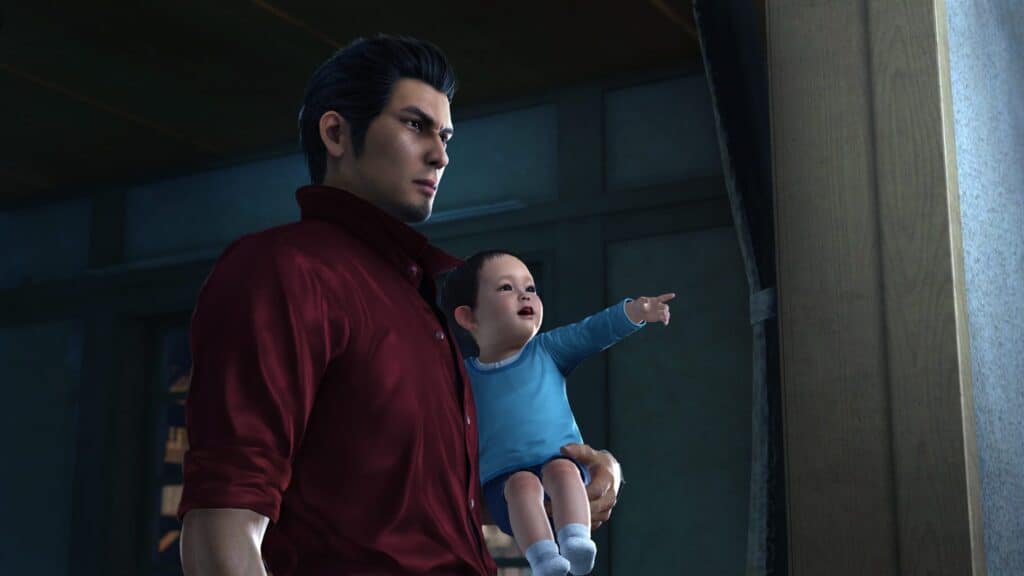
Platforms: PlayStation 4, Xbox One, Windows PC
Yakuza 6 brings Kazuma Kiryu’s story to a close. As he searches for the truth behind a tragic incident, Kiryu becomes embroiled in a conflict that tests his loyalty and values. The game is built on the powerful new Dragon Engine, offering detailed visuals and a more immersive Kamurocho. It’s also notable for featuring voice acting and motion-capture from famous Japanese actors, including “Beat” Takeshi Kitano.
The deep emotional resonance of the plot makes Yakuza 6 a poignant finale to Kiryu’s journey (although you probably won’t be shocked to learn that Kiryu makes a return later in the series). This game provides a satisfying closure to Kiryu’s character arc while delivering the series’ signature blend of crime drama and quirky humor.
Yakuza 0 (2017)
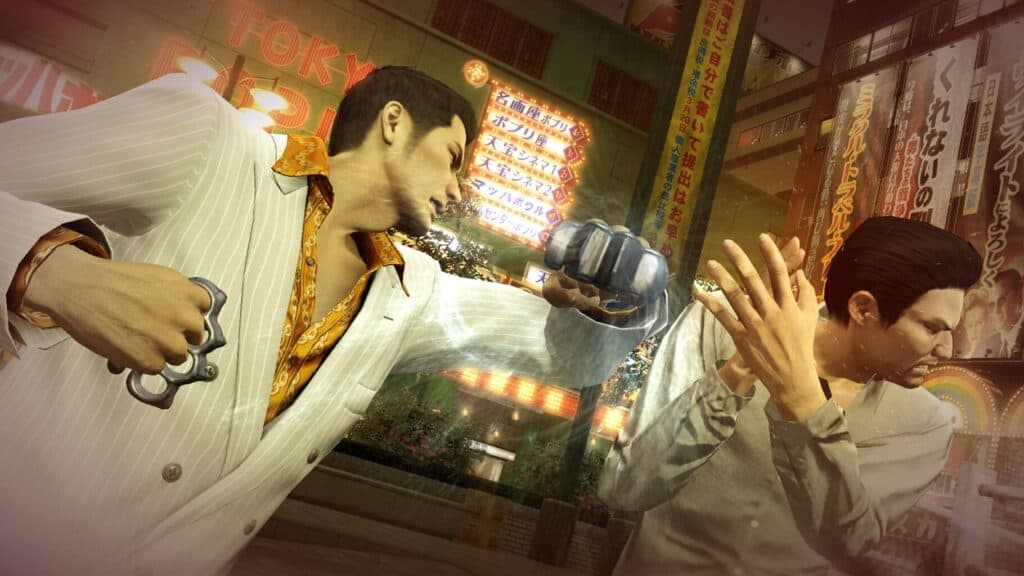
Platforms: PlayStation 4, Xbox One, Windows PC
Yakuza 0 is a prequel to the first game, exploring the origins of Kiryu and Goro Majima in the 1980s. The game delivers a captivating tale of ambition, betrayal, and the rise of the Yakuza in neon-lit Tokyo and Osaka. The unique style of the game, owed almost entirely to its retro ’80s backdrop, made Yakuza 0 a massive hit with fans. It also hugely increased the series’ popularity among Western gamers.
This prequel introduces a refined combat system and side quests to enjoy, including managing a hostess club in Osaka. Yakuza 0 is an excellent blend of gritty crime drama and action juxtaposed against the economic extravagance of Japan’s “bubble era.” It offers a fun 1980s-themed twist on the Yakuza formula while retaining everything fans love about the series.
Yakuza Kiwami (2017)
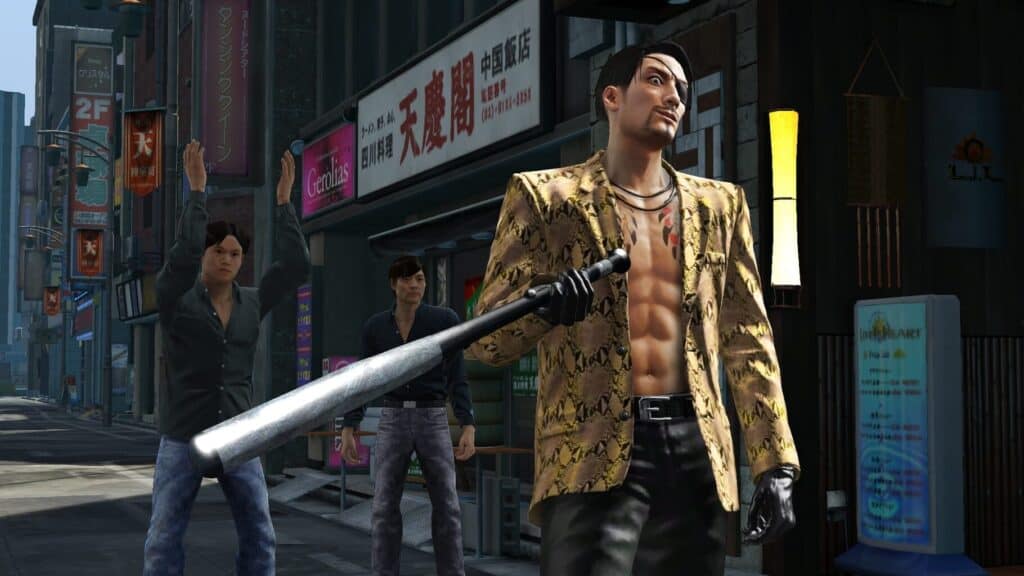
Platforms: PlayStation 4, Xbox One, Windows PC
Yakuza Kiwami is a complete remake of the original Yakuza, revitalizing its story and gameplay. Players revisit Kazuma Kiryu’s original stomping grounds with updated graphics, voice acting, and gameplay improvements. The game also adds new elements to the original story.
Yakuza Kiwami is an excellent remake that brings the original game to a whole new generation of players. It allows newcomers and longtime fans alike to experience the Yakuza saga from the beginning in an experience built for more recent gaming platforms.
Yakuza Kiwami 2 (2018)
Platforms: PlayStation 4, Xbox One, Windows PC
Following the success of the first Kiwami remake, Yakuza Kiwami 2 reimagines Yakuza 2 with modern graphics and gameplay mechanics. This installment refines the Dragon Engine introduced in Yakuza 6, offering even more stunning visuals and immersive world-building than Yakuza Kiwami. That, and its excellent story, make this one a strong favorite among many fans.
The game retains the core storyline of Yakuza 2 with added depth and character development. It also features a setting similar to Yakuza 0, with the story taking place in Tokyo and Osaka. Like its predecessor, Kiwami 2 preserves the integrity of the early Yakuza games while delivering a greatly enhanced experience for modern systems.
Yakuza: Like a Dragon (2020)
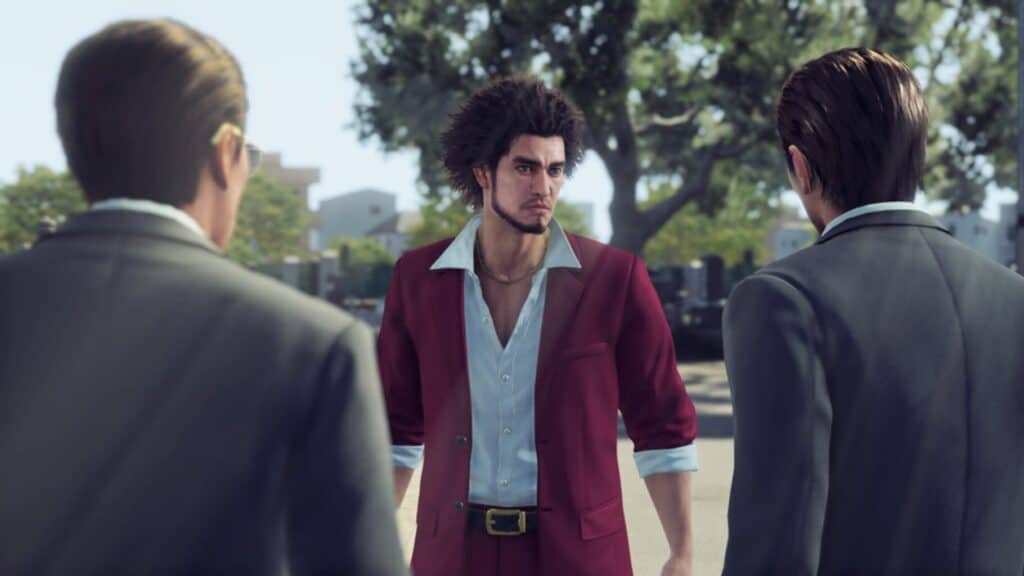
Platforms: PlayStation 4, PlayStation 5, Xbox One, Xbox Series X/S, Windows PC
Yakuza: Like a Dragon marks a departure from the series’ traditional brawler action, introducing a turn-based RPG combat system akin to the Dragon Quest games (a franchise that Like a Dragon itself humorously references a lot). This time, players step into the shoes of Ichiban Kasuga, a new protagonist with a deep sense of loyalty and a penchant for over-the-top heroics.
The game takes the Yakuza series in a very new direction and explores themes of personal growth and friendship. Its RPG-style combat system, quirky minigames, and humorous storytelling both connect it to and set it apart from previous entries. Despite its uniqueness, there’s no denying that Like a Dragon still has the heart and soul of the Yakuza games.
Like a Dragon: Ishin! (2023)
Platforms: PlayStation 4, PlayStation 5, Xbox One, Xbox Series X/S, Windows PC
Like a Dragon: Ishin! is a remake of the Japan-exclusive PS3 title, Ryū ga Gotoku Ishin! This spin-off takes a bold departure from the modern-day setting of the mainline Yakuza titles, transporting players to Japan’s late Edo period during the Bakumatsu era. It features a unique blend of fact and fiction as players step into the shoes of real-life historical samurai, such as Ryoma Sakamoto, reimagined within the Yakuza universe.
The game retains many signature Yakuza elements, including different combat styles, open-world exploration, and plenty of minigames and side activities. Players experience a turbulent period of Japan’s history while navigating a gripping plot filled with political intrigue and personal vendettas. Like a Dragon: Ishin! immerses fans in a bygone era of samurai honor while still delivering the series’ trademark blend of drama, humor, and action.
Like a Dragon Gaiden: The Man Who Erased His Name (2023)
Platforms: PlayStation 4, PlayStation 5, Xbox One, Xbox Series X/S, Windows PC
We told you Kiryu was coming back (which, admittedly, everybody was expecting to happen). Like a Dragon Gaiden: The Man Who Erased His Name is the latest installment in the series, taking place after the events of Yakuza 6. Following his faked death and withdrawal from the Yakuza life, Kiryu assumes a new identity and becomes a secret agent working for the Daidoji faction.
The Man Who Erased His Name returns to the classic Yakuza gameplay, featuring brawler-style combat with new twists. Kiryu now has two fighting styles: his trademark hand-to-hand style and the new speed-focused “Agent” style, allowing him to use high-tech gadgets. The story introduces plenty of new characters, as well as some who are returning from previous Yakuza games.
The Yakuza games have come a long way since their inception, consistently delivering memorable characters, intricate stories, and top-notch world-building. Each installment adds its own unique flavor to the mix, whether through its character-driven storytelling or immersive open-world gameplay. The Yakuza franchise remains a standout example of how a long-running series can evolve while staying true to its core identity, and it continues to captivate fans with tales of crime, drama, and redemption in Japan’s criminal underworld.
